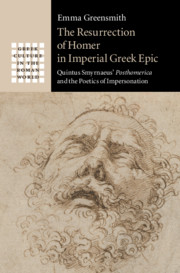 The Resurrection of Homer in Imperial Greek Epic
The Resurrection of Homer in Imperial Greek Epic Book contents
- The Resurrection of Homer in Imperial Greek Epic
- Greek Culture in the Roman World
- The Resurrection of Homer in Imperial Greek Epic
- Copyright page
- Dedication
- Contents
- Figures
- Acknowledgements
- Editions, Translations and Abbreviations
- Chapter 1 Beginning Again (Introduction)
- Part I Quintus as Homer: Illusion and Imitation
- Part II Quintus as Quintus: Antagonism and Assimilation
- Chapter 4 When Homer Quotes Callimachus
- Chapter 5 Selective Memory and Iliadic Revision
- Chapter 6 Prodigal Poetics
- Chapter 7 Temporality and the Homeric Not Yet
- Bibliography
- Index Locorum for Resurrection of Homer
- Subject index for Resurrection of Homer
Chapter 6 - Prodigal Poetics
Filiation and Succession
from Part II - Quintus as Quintus: Antagonism and Assimilation
Published online by Cambridge University Press: 23 September 2020
- The Resurrection of Homer in Imperial Greek Epic
- Greek Culture in the Roman World
- The Resurrection of Homer in Imperial Greek Epic
- Copyright page
- Dedication
- Contents
- Figures
- Acknowledgements
- Editions, Translations and Abbreviations
- Chapter 1 Beginning Again (Introduction)
- Part I Quintus as Homer: Illusion and Imitation
- Part II Quintus as Quintus: Antagonism and Assimilation
- Chapter 4 When Homer Quotes Callimachus
- Chapter 5 Selective Memory and Iliadic Revision
- Chapter 6 Prodigal Poetics
- Chapter 7 Temporality and the Homeric Not Yet
- Bibliography
- Index Locorum for Resurrection of Homer
- Subject index for Resurrection of Homer
Summary
Considers how Quintus captures his stance towards Homer through the presentation of family relationships. Harnessing the frequent collusion between generational and poetic succession (examined using Harold Bloom’s ‘anxiety of influence’ and very prevalent in silver Latin poetry), Quintus first depicts a series of failed rivalrous filial usurpations – Penthesilea, Ajax, Achilles, Memnon – and shows that they fail because of their violent antagonism. He then portrays the two most successful examples of succession – Neoptolemus and Athena – as characterised by impersonation, embodiment and necromantic possession. This contrast becomes a reading of Quintus’ own positive and assimilating approach to Homer. Becoming the poetic father thus becomes the surest way to achieve lasting renown.
Keywords
- Type
- Chapter
- Information
- The Resurrection of Homer in Imperial Greek EpicQuintus Smyrnaeus' <I>Posthomerica</I> and the Poetics of Impersonation, pp. 226 - 279Publisher: Cambridge University PressPrint publication year: 2020
